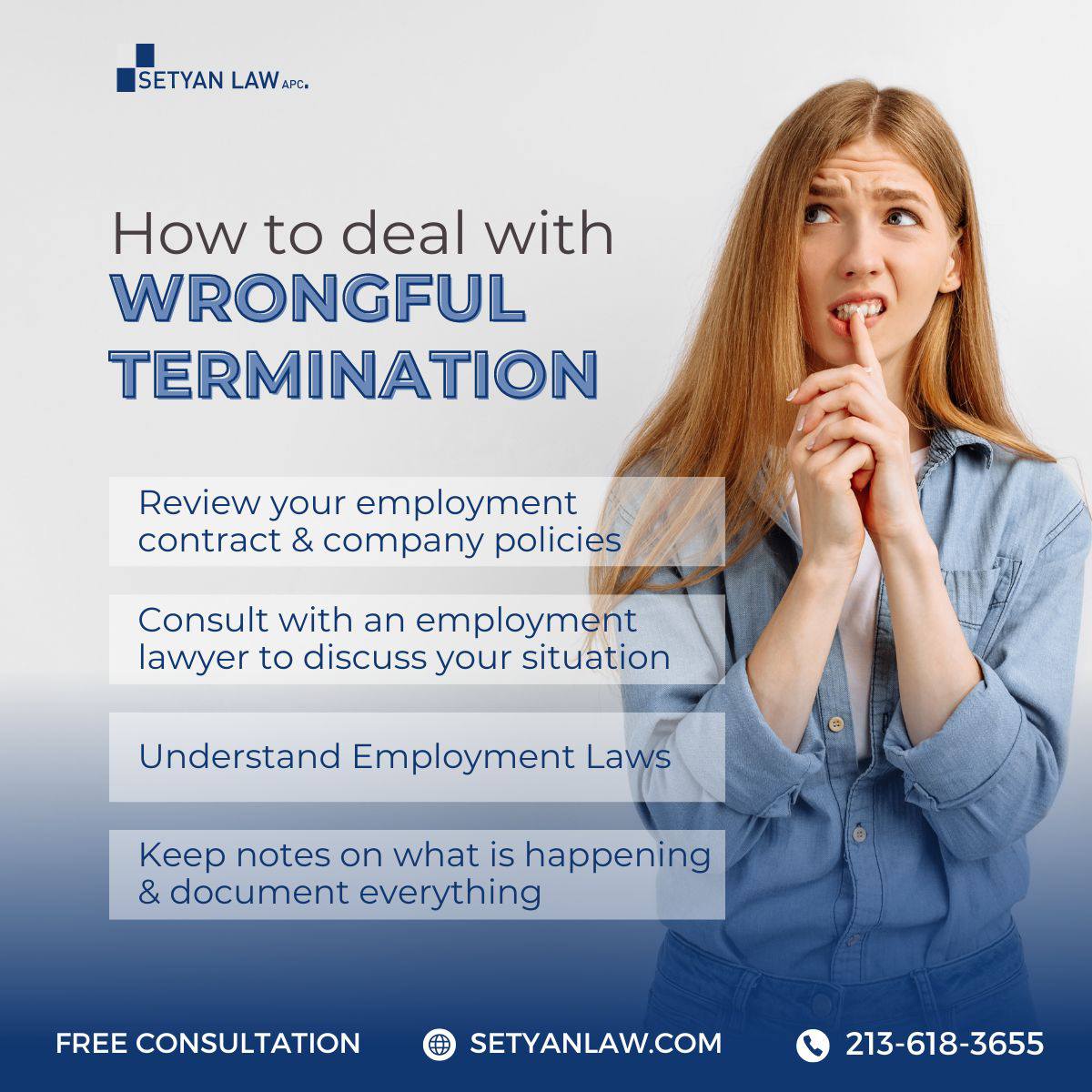Updated January 17, 2026
The Psychological Effects of Wrongful Termination
Being fired delivers psychological effects that extend far beyond the immediate loss of income. Most people expect the financial strain, yet few are prepared for the profound emotional and mental impact that follows. The experience can feel like a sudden amputation of your professional identity, leaving psychological wounds that often remain unaddressed.
However, understanding these hidden effects is crucial for both those experiencing job loss and the employers who initiate terminations. Beyond the obvious financial concerns, being fired triggers a complex cascade of emotions—from shock and denial to anxiety and diminished self-worth—that can persist long after finding new employment.
In fact, research shows that involuntary job loss ranks among life's most stressful experiences, comparable to divorce or major illness in its psychological impact. Despite this, the mental health aspects of termination rarely receive adequate attention during the process.
This article explores the complete psychological landscape of being fired, from the initial emotional shock to long-term mental health implications. We'll examine how termination affects your relationships, social connections, and sense of identity—aspects that HR exit interviews and career counselors often overlook.
The Emotional Shock of Being Fired
The moment of termination often triggers an avalanche of intense emotions that few are fully prepared to handle. When employees receive the news, they frequently report feeling "shock and embarrassment" as their most immediate reactions [1]. This initial emotional response serves as a psychological buffer, protecting the individual from being completely overwhelmed by the sudden change in circumstances.
Initial reactions: shock, denial, and confusion
"I was shocked. When he gave the reasons, I am sure my face showed incredulity at what was being said," reports one terminated employee [1]. This experience of shock is remarkably common, creating a psychological numbness that temporarily shields the person from fully processing the painful reality.
Many describe the moment as surreal—"It felt like I was watching a movie about me being fired. It was hard to grasp. I just sat at my desk, after reading I was being fired, and couldn't move" [1]. This disconnection represents the mind's protective mechanism kicking in, creating emotional distance from a threatening situation.
Subsequently, denial often emerges as individuals struggle to accept their new reality. This manifests in thoughts like "Maybe I'll wake up tomorrow morning and realize this is just a really bad dream" [2]. During this phase, people may avoid telling family and friends about their job loss due to embarrassment, pride, and the emotional labor of repeatedly sharing their story.
Why it feels personal even when it's not
Regardless of the corporate explanation provided—reorganization, downsizing, restructuring—terminated employees frequently interpret the message as "You just weren't worth keeping around" [3]. This personalization occurs because work represents far more than a paycheck—it's fundamentally tied to our sense of value and place in the world.
Furthermore, job loss can trigger deep-seated negative core beliefs rooted in past experiences of rejection. As one psychologist notes, "Suddenly, it's not just about losing a job; it's a full-on attack on your self-worth, making a layoff feel like a personal confirmation of every negative thought you've ever had about yourself" [3].
The termination experience often "shatters fundamental assumptions about oneself and the world" [4], forcing people to confront questions about their competence, value, and future prospects. Even when intellectually understanding the business reasons behind a layoff, the emotional experience remains intensely personal.
The role of identity and self-worth
Work provides far more than financial security—it delivers "recognition, status, belonging, self-esteem, and reinforcement of our self-concept" [5]. When this foundation is suddenly removed, many experience a profound identity crisis.
"I belong to nothing. When you have a job, you belong to something. You're included in something. But now I'm not that. Now I'm just something being tossed around somewhere," explains one person who lost their job [6]. This sentiment reflects how deeply employment is woven into our social fabric and self-perception.
The connection between employment and self-worth is particularly strong in contemporary society. Psychotherapist Charles Allen explains that "having a job to go to everyday is very closely linked to self-worth and self-esteem" because it makes you "feel like you are a contributing member of society" [7].
Indeed, our professional roles often become shorthand for our identities. As one job-seeker noted, "As soon as you enter a larger context, meet new people, you're asked: 'Hi, what's your name?' The next question is what you do for a living. When you're out with new people who don't know you, this question really feels sad, since that's what identity is all about" [6].
Consequently, rebuilding a sense of identity and worth becomes one of the most challenging aspects of moving forward after being fired—a process that extends far beyond simply finding new employment.
The Long-Term Psychological Effects
While the initial shock of termination eventually subsides, job loss often leaves lasting psychological imprints that can persist for months or even years. Research indicates that the longer someone remains unemployed, the more severe these psychological effects become [8].
Chronic stress and anxiety
Job loss triggers what experts call "invisible stress"—a persistent form of tension that silently infiltrates multiple aspects of life without warning [9]. This isn't merely about financial concerns; it encompasses fears about identity, stability, pride, and survival [9].
According to studies, unemployment is strongly linked to increased rates of anxiety disorders [10]. This anxiety manifests as persistent worry about the future, difficulties with concentration, and a general sense of emotional imbalance [11]. Notably, research shows that when unemployment stretches beyond six months, anxiety symptoms intensify dramatically [12].
Depression and loss of motivation
A 2021 Pew Research survey found that approximately 56% of unemployed individuals report experiencing an increase in mental health conditions like depression and anxiety [13]. Depression after job loss often extends beyond normal sadness, developing into clinical conditions that require intervention.
Those experiencing job loss depression frequently report:
- Feelings of worthlessness, self-hate, or guilt
- Persistent fatigue or chronic lack of energy
- Loss of interest in once-pleasurable activities
- Social withdrawal and isolation [10]
Moreover, depression symptoms appear to affect men slightly more than women following job loss, possibly because men in traditional roles may tie their self-worth more closely to their employment status [14].
Sleep disturbances and physical symptoms
Sleep problems represent one of the most common yet overlooked consequences of unemployment. A Japanese population survey revealed that unemployed people showed a significantly elevated risk of insomnia-related symptoms [15]. Additionally, studies found that unemployed individuals lie down 59 minutes more during a typical day yet experience poorer sleep quality [16].
These disruptions aren't merely inconvenient—they're potentially dangerous. Research links unemployment-related insomnia to various health problems, including depression and metabolic syndrome [15]. Furthermore, insufficient sleep causes substantial economic losses (between 88 and 138 billion dollars) through reduced work performance and increased sick days [15].
Lingering fear of future job loss
Perhaps most insidious among the long-term effects is the persistent fear of future job loss that continues even after securing new employment. This phenomenon, sometimes called "job insecurity," creates a psychological state where individuals never fully recover their sense of professional safety.
Research shows that when job insecurity persists for four years or longer, people become less emotionally stable, less agreeable, and less conscientious [12]. This psychological damage can hamper future career prospects by affecting workplace relationships and performance.
Essentially, being fired doesn't just represent a one-time event—it fundamentally alters how a person perceives their professional value and security, creating psychological vulnerabilities that may remain long after the termination itself has faded from memory.
The Financial Fallout and Its Mental Toll
Beyond the psychological trauma, job loss creates immediate financial vulnerabilities that further compound emotional distress. This financial fallout often triggers a destructive cycle that worsens mental health outcomes long after the termination letter is received.
How financial instability worsens emotional distress
Financial worries following job loss create a particularly toxic form of stress. Research reveals that higher financial worries are significantly associated with higher psychological distress [17]. This relationship creates a vicious cycle—unemployment leads to financial strain, which increases depression, which decreases personal control, which further deteriorates emotional functioning and physical health [18].
Specifically, adults who received unemployment insurance benefits had approximately twice the likelihood of experiencing clinically significant anxiety and depressive symptoms compared to their employed counterparts [19]. These effects aren't temporary; studies suggest that even reversible life events such as job loss can have lasting effects on those who experience them [18].
Interestingly, the impact of financial strain varies across socioeconomic groups. For individuals with higher pre-unemployment incomes, the psychological toll can actually be more severe. Research indicates that the association between unemployment and unmet healthcare needs was strongest among middle-income families [1]. This seemingly counterintuitive finding may stem from the greater difficulty higher-income individuals face in adapting to sudden income reduction due to their previous consumption levels [1].
The pressure of supporting a family
For those with families, job loss creates a unique constellation of worries. Questions like "What if we can't pay our bills? Should we sell one of the cars? Will we lose our home?" constantly burn in the minds of unemployed breadwinners [20].
The pressure intensifies when children are involved. Nearly 7 million children lose employer-sponsored insurance when parents lose jobs [21]. Although most become eligible for Medicaid or CHIP coverage, the transition process itself creates additional stress for already struggling families.
Older workers face distinct challenges. As one 61-year-old who lost his job explained, questions like "What if I'm too old and nobody will hire me?" and "What if technology has surpassed me?" compound financial anxieties with existential ones [20]. This combination frequently manifests as depression, which is "almost inevitable when someone loses a job" [20].
Loss of benefits and healthcare access
Perhaps the most tangible secondary loss after termination is healthcare coverage. Over half of Americans receive health insurance through their employer [22]. When this safety net disappears, patients face new and sometimes overwhelming healthcare access challenges.
The statistics are sobering: approximately 60% of the unemployed (9 million of 15 million) became uninsured between 2008 and 2010 [1]. Without coverage, many avoid routine care, allowing minor problems to escalate into serious—and expensive—health concerns [22].
For those with chronic conditions or serious illnesses, the consequences can be devastating. A recent survey confirmed that economic strain and job loss impeded cancer patients' ability to access care, with nearly 40% reporting that financial impact affected their ability to pay for healthcare [22].
Though options like COBRA continuation coverage exist, they're often prohibitively expensive, requiring unemployed workers to pay the entire premium—averaging $7,188 for a single person and $20,576 for a family of four—plus an additional 2% administrative fee [21].
How It Affects Relationships and Social Life
Job loss shatters more than just careers—it fundamentally disrupts the social fabric of daily life. The workplace serves as a primary source of human connection, and when that connection severs, the ripple effects extend throughout a person's social ecosystem.
Strain on family dynamics
Family relationships often bear the heaviest burden when someone loses their job. Research reveals that the risk of divorce roughly doubles when a parent becomes unemployed [4]. This strain manifests through what researchers call the "family stress model," where economic hardship produces parental worries that lead to increased marital conflict, disharmony, and strained parent-child relationships [2].
Children, besides, experience significant impacts when parents lose employment. Studies show that children with unemployed single mothers face higher risks of not living with their mother in the year following her job loss [4]. Parental stress from joblessness can also make children more susceptible to developing depression and anxiety [2].
Social withdrawal and isolation
After termination, many individuals retreat from social connections due to embarrassment, financial constraints, or emotional overwhelm. This withdrawal creates what experts describe as a "devastating impact" on mental health [23]. One major factor is the sudden loss of daily interactions with colleagues and professional networks.
Former coworkers often avoid contact with terminated employees, primarily from awkwardness rather than ill intent. As one clinical psychologist explains, "People feel really awkward when their coworkers get laid off. They're not sure how to approach that… so they just avoid the situation" [24].
Loss of routine and community
Workplaces provide not just employment but a sense of belonging and community. Following termination, many report feeling a profound disconnection—"I belong to nothing. When you have a job, you belong to something" [25]. This loss of routine and structure compounds feelings of isolation.
The impact reaches beyond mere loneliness. Prolonged social isolation following unemployment leads to elevated levels of stress hormones [23], creating a physiological response that further deteriorates mental health. Overall, research indicates that the health impact of this isolation is comparable to smoking and greater than both obesity and physical inactivity [26].
Simply knowing people isn't enough—what matters is genuine connection. As one expert notes, "Knowing people isn't the same as being connected to them" [24], highlighting why social support networks are crucial yet challenging to maintain after job loss.
California Article XIV
Article 14 of the California Constitution is a powerful tool for protecting workers’ rights. It remains a cornerstone of California labor law. By empowering workers and regulating employer practices, it ensures:
- Equitable treatment in the workplace.
- Stronger recourse for employees facing unjust actions.
- A balance of power between employees and employers.
What Companies Can Do to Reduce Harm
Companies wield significant power in reducing the psychological damage caused by terminations. When implemented thoughtfully, certain practices can significantly lessen the emotional trauma for both departing employees and those who remain.
Transparent communication during layoffs
First and foremost, clear, empathetic communication becomes a leader's most powerful tool during layoffs. Vague statements and mixed messages typically spark speculation, rumors, and increased anxiety. In contrast, transparent leaders acknowledge uncertainty rather than denying it. As one CEO suggests, "Clarity is kind. When you avoid the truth, you create more anxiety than if you just shared what you know." Accordingly, companies should communicate before, during, and after layoffs—not waiting for final decisions to start conversations.
Offering mental health support and EAPs
Employee Assistance Programs (EAPs) provide vital support during terminations. These voluntary, work-based programs offer free and confidential assessments, short-term counseling, referrals, and follow-up services to employees experiencing personal or work-related problems. EAPs address a broad range of issues affecting mental well-being, including:
- Stress management
- Grief counseling
- Family problems
- Substance abuse concerns
- Psychological disorders
Above all, companies should ensure employees know these services remain confidential, making them feel secure in seeking support.
Training managers to handle terminations with empathy
Managers need proper training to deliver difficult news with compassion. This involves active listening—being fully present and tuned into the person to notice non-verbal cues like body language. With this in mind, role-playing termination conversations helps managers prepare emotionally and ensure they communicate effectively. Leaders should balance policy requirements with values-led approaches that demonstrate care and compassion.
Providing career transition services
Outplacement services help terminated employees find new positions faster. These services include personal assessments, coaching, upskilling courses, branding assistance, and interview preparation. Beyond helping departing staff, these programs benefit remaining employees by increasing their sense of job security and loyalty. Furthermore, effective outplacement services improve company reputation—how you say goodbye matters just as much as how you welcome employees.
Conclusion
The termination of employment clearly extends far beyond a simple career disruption. Throughout this article, we have explored the multifaceted psychological impact that follows job loss—effects that often remain hidden yet profoundly shape an individual's wellbeing. Consequently, understanding these deep-rooted consequences becomes essential not just for those experiencing termination but also for employers who initiate these difficult transitions.
Job loss triggers a cascade of emotional responses, starting with shock and denial, eventually evolving into more persistent psychological challenges. Additionally, the intimate connection between professional identity and self-worth makes termination feel deeply personal, regardless of the corporate reasoning behind it. These initial wounds, though painful, represent merely the beginning of a complex psychological journey.
Equally important, the long-term effects—chronic anxiety, depression, sleep disturbances, and persistent fear of future job insecurity—can linger for months or even years after the termination event itself. Financial strain further compounds these challenges, creating a destructive cycle that worsens mental health outcomes, particularly for those supporting families or facing healthcare access issues.
Social relationships suffer as well. Family dynamics face unprecedented pressure, often leading to increased conflict and potential relationship breakdown. Meanwhile, social withdrawal becomes common as terminated employees retreat from their networks due to embarrassment or financial constraints. The sudden loss of workplace community and daily structure only amplifies these feelings of isolation.
Companies, however, possess significant power to mitigate these harmful effects. Transparent communication during layoffs, comprehensive mental health support, empathetically trained managers, and robust career transition services can dramatically reduce the psychological toll of termination. These approaches benefit not only departing employees but also enhance company reputation and maintain morale among remaining staff.
Understanding the hidden psychological effects of being fired ultimately serves everyone involved. For individuals experiencing job loss, recognizing these effects as normal responses rather than personal failings can facilitate healing. For employers, acknowledging the full human impact of termination decisions enables more compassionate approaches. Despite its painful nature, job loss—when handled with awareness and empathy—need not become a devastating psychological wound but rather a challenging transition that people can navigate with appropriate support.
References
[1] – https://pmc.ncbi.nlm.nih.gov/articles/PMC4202960/
[2] – https://pmc.ncbi.nlm.nih.gov/articles/PMC9207136/
[3] – https://www.psychologytoday.com/us/blog/the-power-of-parallels/202401/why-getting-laid-off-feels-so-personal
[4] – https://www.urban.org/urban-wire/lose-your-job-lose-your-family-how-unemployment-affects-family-stability
[5] – https://hbr.org/2021/02/when-you-lose-your-job-and-its-your-whole-identity
[6] – https://pmc.ncbi.nlm.nih.gov/articles/PMC5736997/
[7] – https://bayaudenterprises.org/the-link-between-employment-and-self-esteem/
[8] – https://www.sciencedirect.com/science/article/abs/pii/S1570677X21000666
[9] – https://ceoptions.com/2025/04/fear-of-losing-your-job-how-to-turn-panic-into-power/
[10] – https://www.healthline.com/health/depression/job-loss
[11] – https://www.calm.com/blog/job-loss-anxiety
[12] – https://www.apa.org/monitor/2020/10/toll-job-loss
[13] – https://www.talkiatry.com/blog/job-loss-depression
[14] – https://www.choosingtherapy.com/job-loss-depression/
[15] – https://pmc.ncbi.nlm.nih.gov/articles/PMC6885596/
[16] – https://onlinelibrary.wiley.com/doi/10.1111/jsr.13516
[17] – https://pmc.ncbi.nlm.nih.gov/articles/PMC8806009/
[18] – https://www.apa.org/news/press/releases/2002/10/unemployment
[19] – https://www.milbank.org/2023/10/unemployment-and-mental-health-an-important-opportunity-for-cross-sector-action/
[20] – https://www.focusonthefamily.com/marriage/five-ways-to-support-your-spouse-after-a-job-loss/
[21] – https://www.kff.org/coronavirus-covid-19/issue-brief/eligibility-for-aca-health-coverage-following-job-loss/
[22] – https://allianceforpatientaccess.org/as-unemployment-rises-so-does-health-care-insecurity/
[23] – https://www.psychologytoday.com/us/blog/jobless-not-joyless/201208/some-thoughts-for-the-unemployed-on-avoiding-the-trap-of-social
[24] – https://www.fastcompany.com/91205188/how-to-deal-with-loneliness-after-a-layoff
[25] – https://www.fastcompany.com/90901984/how-to-get-over-the-gut-punch-of-getting-fired
[26] – https://bmcpublichealth.biomedcentral.com/articles/10.1186/s12889-022-13107-x
Why Choose Setyan Law, APC?
Consulting a wrongful termination attorney will provide you with the necessary guidance and support to navigate the legal process effectively. Remember, time is of the essence, so seek legal advice promptly to maximize your chances of a successful outcome.
Call Setyan Law at (213)-618-3655 for a consultation.








